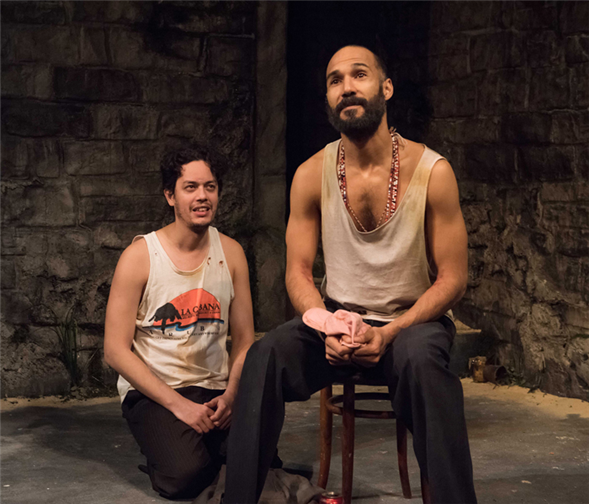Translate Page

A new play explores a community in Old San Juan
---
Old San Juan, Puerto Rico. A Spanish fort stands onstage, a stone-wrought relic from the district's colonial past.
But the past is of little concern in Tell Hector I Miss Him. Playwright Paola Lázaro instead sets her eyes on the people living in the region today. "I wanted it to be a portrait of a community," she says.
Community, indeed. Tell Hector, which runs through February 19th at the Atlantic Theater Company, features no fewer than 12 characters.
While there is no unifying narrative that brings them all together, the play works like an anthology of interwoven short stories. Almost everyone in town plays a major role in a minor drama of his or her own, and many of them do business with one another on a regular basis, whether they're buying Gatorade at a bodega or selling cocaine on the street.
We meet a handful of young people, almost all of whom come from broken homes. Tonio, for instance, a teen of great intelligence, lives with a single mother who spends her days guzzling wine and watching reality T.V.
Others have left home altogether, in some cases for their own safety. Take Malena, the most beautiful girl in town, who suffered the blows of an abusive father for years before finally moving out.
But how can a community hold together when it's full of splintered families and crime-ridden streets?
{Image1}
Part of the answer lies in temperament. The kids have it rough, to say the least, but as Lázaro points out, "They don't feel bad for themselves." Their resilience in part enables them to make light of all their hardships. In fact, the play abounds in good jokes, some of which are cracked by a drug-addicted clown-figure known only as El Mago, which in Spanish means "the magician."
The teens also have a surrogate mother and father at the local colnado, the tiny bodega owned and operated by the middle-aged Mostro and Samira, his wife. For many of the teens, says Lázaro, it serves as "a home away from home."
Some residents treat Mostro as a therapist of sorts, a confidant who can help them cope with their sorrows. Referring to a scene in which a suicidal resident, revolver in hand, shows up at Mostro's door, Lázaro says, ""[Mostro and Samira are] the people you come to and say, 'I want to die. Really I do.' And whether or not they can help you, they're still the people that people look up to."
Mostro also acts as an unofficial law enforcer, punishing any member of the community who dares to misbehave. At one point, he confronts a young man, guilty of assaulting his girlfriend, and orders him to vanish from the neighborhood.
Lázaro also points out that Old San Juan, like most communities, is far bigger than the people who actually live there. Isis, a terminally ill schoolgirl who hails from another town nearby, quickly becomes a familiar face after falling madly in love with Malena.
The playwright also wants to remind us of the homeless population. A girl nicknamed La Gata—or "the cat"—roams the streets like a stray, and whenever strangers address her, she replies with an enigmatic "meow."
What do the drama's dozen characters have in common? For Lázaro, "It always goes back to the relationships and people trying to connect." She summarizes the conflict as follows: "I'm trying to connect with you. I'm trying to connect, oh, and this [obstacle] is preventing us. But I'm still trying, I'm still trying."
---
Gavin Whitehead is a dramaturg and writer based in New Haven.
Photos by Ahron R. Foster. Top photo (L to R): Flaco Navaja and Luis Vega
TDF Members: Go here to browse our discounts for theatre, dance, and concerts.